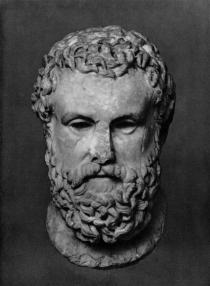Aeschylos
Aeschylus (pronounced /ˈɛskɨləs/ ESS-ki-ləs; Greek: Αισχύλος, Aiskhulos; c. 524/525 BC – c. 455/456 BC) was the first of the three ancient Greek tragedians whose work has survived, the others being Sophocles and Euripides, and is often described as the father of tragedy.[1][2] His name derives from the Greek word aiskhos (αισχος), meaning "shame".[3] According to Aristotle, he expanded the number of characters in plays to allow for conflict amongst them; previously, characters interacted only with the chorus. Only seven of his estimated seventy to ninety plays have survived into modern times; and there is a longstanding debate about his authorship of one of these plays, Prometheus Bound.
At least one of Aeschylus's works was influenced by the Persian invasion of Greece, which took place during his lifetime. His play The Persians is a source of information about this period in Greek history. So important was the war to Aeschylus and the Greeks that, upon his death around 456 BC, his epitaph commemorated his participation in the Greek victory at Marathon rather than his success as a playwright.

